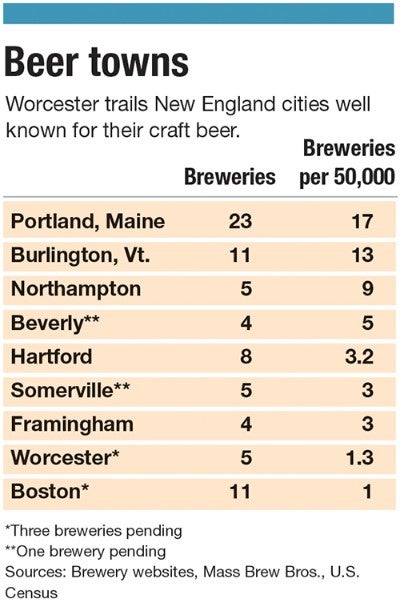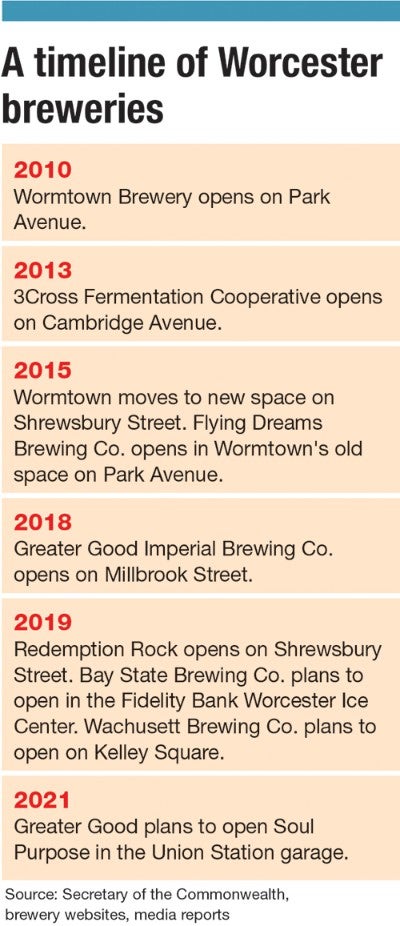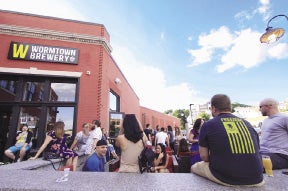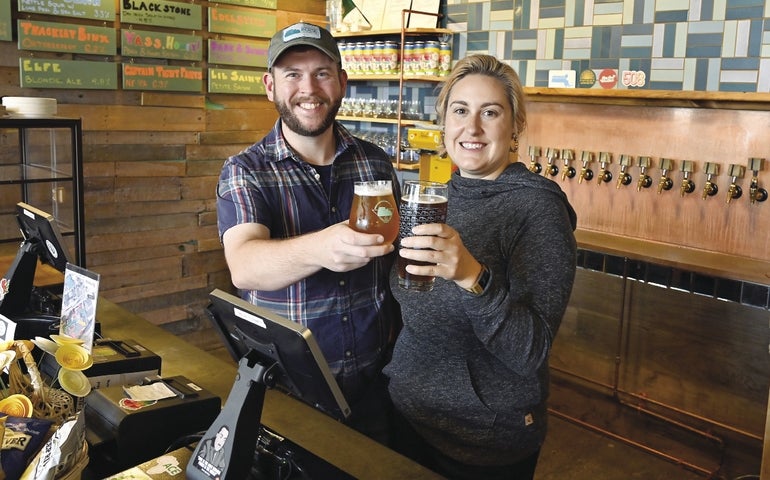In less than a decade, Worcester went from having no craft breweries to five in 2019, and by 2022, at least eight brand names will produce beer within city limits.
Get Instant Access to This Article
Subscribe to Worcester Business Journal and get immediate access to all of our subscriber-only content and much more.
- Critical Central Massachusetts business news updated daily.
- Immediate access to all subscriber-only content on our website.
- Bi-weekly print or digital editions of our award-winning publication.
- Special bonus issues like the WBJ Book of Lists.
- Exclusive ticket prize draws for our in-person events.
Click here to purchase a paywall bypass link for this article.
In less than a decade, Worcester went from having no craft breweries to five in 2019, and by 2022, at least eight brand names will produce beer within city limits.
Despite the rapid increase of Worcester breweries, industry leaders say the city has room for several more before it is elevated to the status of popular beer towns like Portland, Maine and Asheville, N.C.
In a June study by Illinois online marketplace Bid-on-Equipment, Worcester ranked as the 26th best U.S. city in which to open a brewery. Those cities were ranked on criteria including state excise tax, population aged over 21, licensing fees and breweries per capita.
“There is a ton of space for breweries in Worcester,” said Dani Babineau, CEO of Redemption Rock Brewing in Worcester.“It should be higher on that list.”
With five breweries Worcester has 1.3 breweries per 50,000 people, which was tied for the lowest on the Bid-on-Equipment list out of 30 cities.

Burlington, Vt. and Portland, Maine are famous beer towns attracting visitors from far and wide, with 11 and 20 breweries boasting some of the biggest names in craft beer like Magic Hat Brewery and Allagash Brewing Co. but with populations of 42,200 and 66,900, respectively. That comes out to 13 and 17 breweries per 50,000 people, respectively.
Worcester’s rising brewery potential
Wormtown Brewery was the first to open in 2010, followed by 3Cross Fermentation Cooperative in 2013 and Flying Dreams Brewing Co. in 2015. Greater Good Imperial Brewing Co. opened on Millbrook Street in March 2018 and Redemption Rock opened on Shrewsbury Street in January.
Over the next two years, three more breweries will open facilities in Worcester. Wachusett Brewing Co., already a well-established New England brewer based in Westminster, will open a brewery and taproom on Kelley Square this fall. Bay State Brewing Co. will open in the Fidelity Bank Worcester Ice Center in late 2019 or early 2020. By 2021's end, Greater Good plans to move sister brand Soul Purpose to a standalone spot in Union Station's parking garage.

For Bart Watson, chief economist for national trade group Brewers Association, a city becomes a beer town when the industry fuels local tourism. That’s the case in Portland, Burlington, Asheville, and West Coast cities like Denver and Seattle, but so far, not Worcester.
“It’s where the brand of being a brewery from a certain city helps you out in the world,” Watson said. “If you’re a brewery from Portland, it’s a sign that you’ve made it.”
However, Worcester’s stock as a beer destination is rising, Watson said. The city’s credibility with beer experts rose a bit in September with the news of Scott Metzger, founder of Texas-based Freetail Brewing Co., joining Wormtown as a general manager.
Metzger – a director at the Brewers Association – and Freetail helped launch the Texas craft beer scene and, said Watson, is a well-known figure in the industry. Metzger himself admitted he was not privy to Worcester’s beer scene before inquiring about the job, but his placement in Worcester has boosted the city’s image as a beer town.
The city’s status as an unheralded destination for beermakers can actually play into its hands, with plenty of market share to go around.
With more mature beer markets like Portland, Vermont and Greater Boston flooded with new breweries, Watson said, businesses will look to establish themselves in cities like Worcester, an urban setting with less competition.
According to the Brewers Association, Massachusetts had 155 breweries in 2018 vs. 45 in 2011. Nationwide, that number has increased to 7,346 in 2018 from 2,016 in 2011.
“That’s a place where you’re not going to be defined by competition,” Watson said. “You’ll be defined by what you do.”
In Worcester, each brewery operates on a different business model. Wormtown is the largest brewery, with a multi-state distribution network, on pace to exceed 35,000 barrels this year after brewing fewer than 25,000 in 2018.
Greater Good Imperial Brewing Co., with a large distribution network via Auburn-based Atlas Distributing, is on track to brew 7,000 barrels this year.
Redemption Rock sells beer in its taproom and a few restaurants, while Flying Dreams and 3Cross offer taproom sales and brew a few hundred barrels each annually.
Worcester’s enthusiasm for beer
Locally, there is much more excitement about Worcester’s growing beer scene, according to local brewers. That has culminated with the announcement of incoming breweries and the first-ever Worcester Beer Week, kicked off with the Massachusetts Brewers Guild’s Great Mass Collab on Sept. 21 featuring a beer brewed together by all five existing Worcester breweries.
The event included a shuttle service from Union Station to all of the city’s breweries on Sept. 27 and a beer-themed scavenger hunt on Sept. 28.
Worcester is growing as a beer destination, which is why the guild chose it for its signature fall festival, said guild Executive Director Katie Stinchon.
“With five breweries … and a ton of great beer bars, Worcester is definitely emerging as a go-to beer town in the state,” Stinchon said.
However, that comes with a caveat. With the U.S. craft beer market becoming saturated, the model has shifted from large regional brewers to smaller taproom-focused operations.
That’s partly why Greater Good Founder Paul Wengender chose to open in Worcester after contract brewing in Williamsburg.
Aside from having business relationships in the city as the former CEO of Blue Sky BioServices, Wengender said Worcester’s demographics, colleges, urban setting, new housing developments and being the second largest city in New England were attractive.
Those reasons are why Greater Good is pursuing moving its Soul Purpose brand of lighter beers to a location at Union Station. The brewery is negotiating with the city on a lease to put a small production facility and taproom within several hundred yards of the overall $240-million development of hotels and market-rate housing anchored by a $101-million ballpark for the Worcester Red Sox.
Local beer tourism is now being discussed among the city’s breweries, Wengender said. The Worcester Beer Week offered a glimpse of what it could be with the shuttle. In towns like Portland, third-party companies offer brew tours to collaborating breweries.
“It was only a question of getting to that critical mass of breweries around the city,” Wengender said. “We’re getting to that point very quickly.”
A downtown beer cluster
According to Worcester’s breweries, efforts to foster growth in the craft beer scene should focus on collaboration. That includes walkability and transportation options.
“In Asheville, you park your car and walk or take Lyft and just go to breweries all day,” said Babineau.
So far, the only breweries within walking distance of each other are Wormtown and Redemption Rock on Shrewsbury Street. However, once Wachusett, Bay State and Soul Purpose open, five breweries all will be within a 30-minute walk, crossing paths with the city’s dining destinations in the Canal District and Shrewsbury Street.

At the epicenter of all of that is Union Station, with train service from MetroWest and the Boston area.
The city needs to continue to support those small businesses that breweries look for when surveying sites and their customer base, Babineau said.
“Worcester has a lot of the things you want in a city, but we don’t have quite a ton of them,” she said. “As long as we continue to do that and support those businesses, I think we’re on the right track.”

